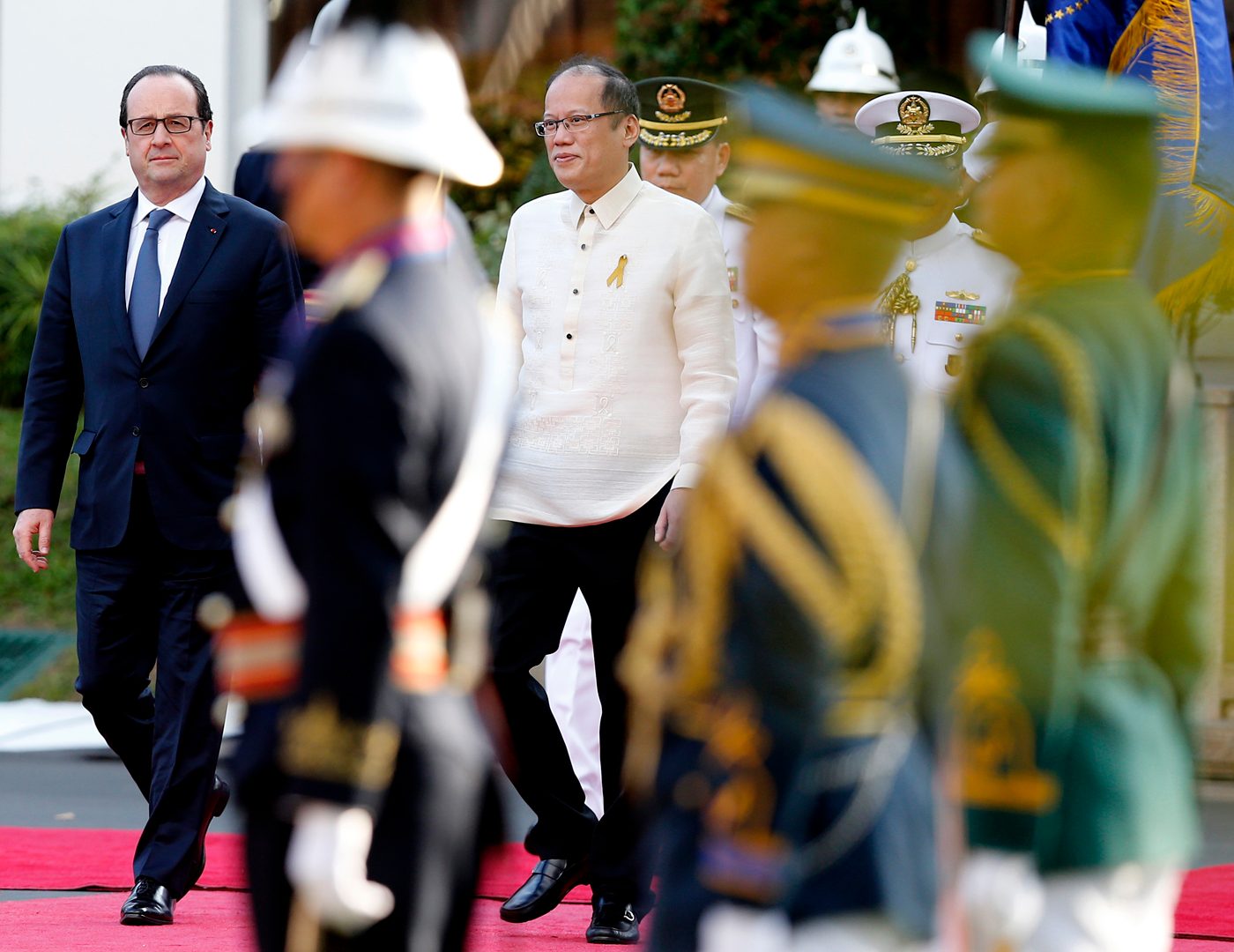SUMMARY
This is AI generated summarization, which may have errors. For context, always refer to the full article.


MANILA, Philippines – The presidents of the Philippines and France, countries on opposite ends of the planet, came together to make a joint call for an ambitious and impactful climate deal this year.
The joint statement, dubbed the “Manila Call to Action on Climate Change,” was given in Malacañang Palace in Manila on Thursday, February 26, after Philippine President Benigno Aquino III welcomed French President Francois Hollande during his first state visit to the Southeast Asian country.
One of the purposes of the French leader’s visit is to drum up support and awareness for a landmark climate change conference in Paris in December this year.
“We call upon the international community to conclude a universal, equitable, and ambitious climate deal…to preserve our planet as a livable place for future generations. From Manila today, we hope to make history together in Paris in December and not simply watch history unfold,” said the two leaders.
” style=”text-decoration: underline;” >Final Text of Manila Call to Action on Climate Change
Time is running out on curbing climate change before it becomes irreversible, said President Hollande in an earlier statement, citing findings of scientists.
It will take immense political will for countries all over the world to agree to ambitious cuts in greenhouse gas emissions – emissions that are causing the earth’s atmosphere to warm up.
But the Manila Call to Action expressed the need for a deal “accepted by everyone and for everyone, an agreement that takes all differences in situations into account, and aims at bridging varying perspectives to hasten collective action.”
Another crucial appeal made by both presidents was for states to present their intended nationally determined contributions (INDCs) – the amount of carbon dioxide emissions each country will aim to cut from its economy.
INDCs are crucial in determining whether humanity will be able to keep global temperatures from rising beyond 2 degrees Celsius.
At the rate the world is going and with no drastic action taken, the Earth could warm by 3 to 5 degrees Celsius by 2050. Such a level of warming means stronger typhoons, debilitating droughts, sea level rise, and mass extinction of species.
Warmer temperatures also endanger agriculture and food security and could even lead to wars over resources, say scientists.
Facing a climate crisis
The world need not look farther than the Philippines to see that climate change is real and dangerous, said President Aquino in a separate speech.
He spoke of Super Typhoon Yolanda (international name: Haiyan), one of the strongest storms in record, which led the Philippines to top a list of countries that suffered the most from climate change.
But a warming climate is evidenced by the fact that the country now experiences more and more “out of season” storms. In the past 4 years, major storms have been hitting the Philippines in the usually dry months of December and January.
“Tropical Storm Washi in 2011, Typhoon Bopha in 2012, and Typhoon Hagupit in 2014 all made landfall in December. There was also Typhoon Mekkhala which occurred in January of this year,” said Aquino.
The steady onslaught of storms has made it difficult for the Philippines to recover from previous storms, he added, affirming an earlier statement by Hollande that poorer countries with almost zero contribution to global warming are its most helpless victims.
The summit in Paris will determine if climate-vulnerable countries have a chance of withstanding the worst of climate change.
For these reason, the world can no longer “be paralyzed by debates over the obligations of individual countries; all of us must do everything we can, in the quickest and most impactful way possible,” said Aquino.
Investments, assistance
Making a joint call from the Philippines helps France achieve its goal for successful Paris climate conference, said Hollande.
“We need the Philippines. We need countries which not only were the victims of disaster but also countries that [are] able to invest, and to express a number of recommendations that will be examples for the Paris conference.”
He admitted to the difficulty of reaching an effective deal, given the many conflicting interests of countries that all want to protect their economies.
“Are we sure that we will reach a binding agreement? If I were to tell you, yes, then I would not be in Manila today…. But I can commit to not giving in, not giving up on everything.”
Hollande’s visit was also marked by the finalization of agreements for more renewable energy investments in the Philippines.
Renewable energy is seen by environmentalists and scientists as the answer to cutting carbon dioxide emissions while still keeping economies running.
At a business summit earlier in the day, renewable energy projects in the Philippines worth an estimated P9 billion (180 million Euros) were formalized.
The country, through its Renewable Energy Act, aims to increase the share of RE in the country’s energy mix. But environmentalists have criticized Aquino for his aggressive coal policy.
Hollande, during a bilateral meeting with Aquino, also offered 50 million Euros ($56.6 million) or P2.5 billion to prevent disasters borne of climate change. – Rappler.com
Add a comment
How does this make you feel?
There are no comments yet. Add your comment to start the conversation.